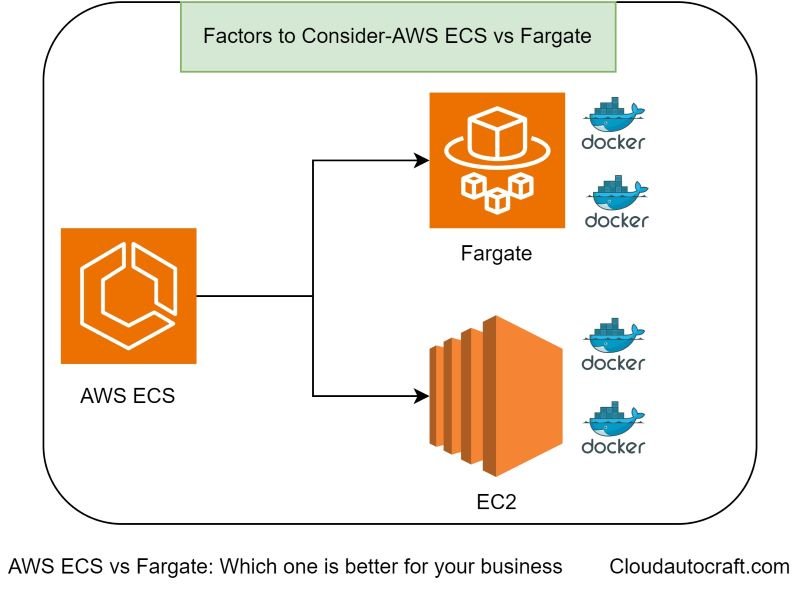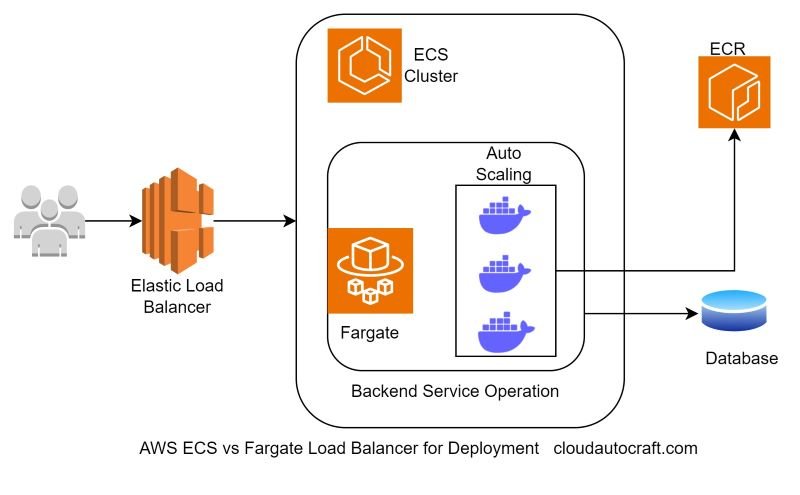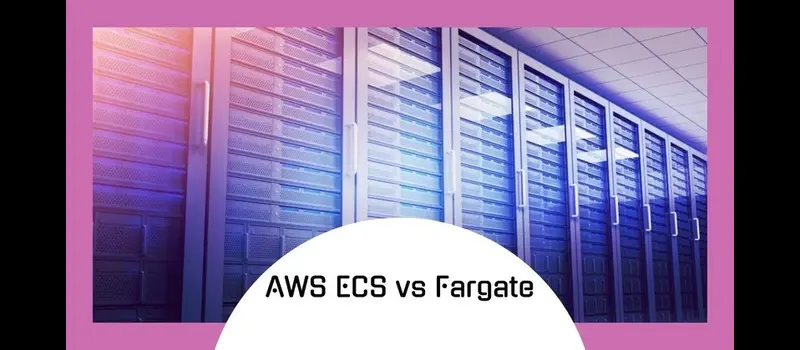Content:
Introduction
If you’re running a business that relies on web applications or microservices, you’ve probably heard of AWS ECS vs Fargate. Amazon Web Services (AWS) offers two popular container orchestration services to help you manage and scale your containerized workloads. Which is the better choice for your business? Aws fargate vs ECS! Find out in this blog post. We’ll dive deep into the features, benefits, and tradeoffs of both ECS and Fargate to help you make an informed decision. Let’s start by understanding the basics of each service.
What is AWS ECS?
AWS Elastic Container Service (ECS) is a highly scalable and fast container management service.
Moreover, it makes running, stopping, and managing Docker containers on a cluster of Amazon Elastic Compute Cloud (EC2) instances easy.
With ECS, you can choose the correct hardware configuration for your containers. You can launch EC2 instances with the amount of CPU, memory, and storage your workloads require. Moreover, This gives you more control over the underlying infrastructure and the ability to optimize costs.
However, this also means you’re responsible for managing the EC2 instances, including provisioning, scaling, and maintaining the cluster. So, This can add some complexity and overhead to your operations.
What is AWS Fargate?
AWS Fargate, on the other hand, is a serverless computing engine for containers. With Fargate, you don’t have to provision or manage any EC2 instances. Instead, you simply define your container specifications, and Fargate handles the rest.
Fargate automatically scales your containers up or down based on the resource requirements of your applications. It also handles tasks like provisioning, scaling, and managing the underlying infrastructure.
This serverless approach can be more convenient and cost-effective, especially for smaller or more variable workloads. However, you have less control over the underlying infrastructure and may pay a higher price per compute resource than managing your own EC2 instances.
Click here to get more insight about How to Maintain AWS Traffic Spikes: Best Practices
Which one is better – AWS ECS vs Fargate
Factors to Consider-AWS ECS vs Fargate:
When deciding between AWS ECS vs Fargate, there are several key factors to consider:

Workload Predictability:
AWS ECS might be the better choice if your workloads are relatively predictable. Additionally, when you can accurately estimate your resource requirements, ECS offers the advantage of optimizing the hardware configuration to match your specific needs. As a result, this can lead to cost savings.
On the other hand, if your workloads are more variable or unpredictable, Fargate’s automatic scaling and serverless approach can be a better fit. Fargate can handle sudden spikes in demand without managing the underlying infrastructure.
Control and Customization:
AWS ECS gives you more control over the underlying infrastructure, allowing you to customize the hardware, networking, and other settings to suit your specific requirements. Therefore, this can be beneficial if you have complex or specialized workloads that require fine-tuning.
Fargate, conversely, is a more abstract and opinionated service, providing a simpler and more streamlined experience. If you don’t need extensive customization and prefer a more hands-off approach, Fargate may be the better choice.
Cost Optimization:
The cost comparison between ECS and Fargate can be tricky, as it depends on various factors, such as your workload patterns, resource requirements, and the AWS pricing models of each service.
If you have consistent, predictable workloads and can optimize your EC2 instances accordingly, ECS may be more cost-effective in the long run. However, if you have more variable or unpredictable workloads, Fargate’s automatic scaling and pay-as-you-go pricing model may lower costs.
Click here to Read more about AWS Cost Optimization Strategies
Operational Complexity:
Managing the underlying infrastructure is a crucial difference between ECS and Fargate. With ECS, you’re responsible for tasks like provisioning, scaling, and maintaining the EC2 instances in your cluster. Moreover, this can add operational complexity and require more technical expertise from your team.
Fargate, however, abstracts away the infrastructure management, making it a more straightforward and less complex option, especially for teams with limited DevOps resources.
Integration with Other AWS Services:
ECS and Fargate integrate well with other AWS services, but the specific integrations may vary. For example, ECS may provide more flexibility in integrating with custom networking configurations or external data sources.
At the same time, Fargate may offer seamless integration with other AWS serverless services, such as AWS Lambda or Amazon S3.

Consider your existing AWS ecosystem and the specific requirements of your application to determine which service might align better with your overall infrastructure.
Choosing the Right Fit – AWS ECS vs Fargate:
Now that we’ve covered the key factors to consider let’s summarize the scenarios where each service might be the better choice: AWS Fargate vs ECS !
Use AWS ECS if:
- Have predictable workloads and can accurately estimate your resource requirements.
- More control and customization are needed over the underlying infrastructure.
- Have a dedicated DevOps team that can manage the complexity of the EC2 cluster.
- Have specific integration requirements that may be easier to achieve with ECS.
Use AWS Fargate if:
- Have variable or unpredictable workloads that require automatic scaling.
- Prefer a more hands-off, serverless approach to managing your containers.
- Have limited DevOps resources and want to minimize operational complexity.
- Workloads don’t require extensive customization or fine-tuning of the underlying infrastructure.
Ultimately, the decision between AWS ECS and Fargate will depend on your specific business needs, the complexity of your workloads, and the resources and expertise available within your team.
Conclusion:
In conclusion, the choice between AWS ECS and AWS Fargate comes down to your business needs. If you prefer more control over the underlying infrastructure and want to optimize costs, ECS may be the better option. However, if you’re looking for a more hands-off approach and want to focus on your application, Fargate could be the ideal choice. Ultimately, it’s essential to carefully evaluate your workload, requirements, and long-term goals to select the platform that best aligns with your business needs and ensures the successful deployment and management of your containerized applications.
Click to get more insight about AWS-Challenge & Cloud-Security
FAQs:
What is the critical difference between AWS Fargate vs ECS?
Answer: The main difference is in how you manage the underlying infrastructure. With ECS, you handle the EC2 instances that host your containers. Fargate, on the other hand, is a serverless container platform, so AWS handles all the infrastructure for you. So, this means less overhead and management for your team with Fargate.
When should I choose AWS ECS over AWS Fargate?
Answer: Choose AWS ECS when you need more control over the underlying infrastructure. It lets you manage your own EC2 instances, which can be cost-effective for specific workloads. However, if you prefer not to handle the server management and want to focus purely on your applications, AWS Fargate is the better option. It abstracts away the infrastructure, allowing you to run containers without managing servers.
How does pricing differ between AWS Fargate vs ECS?
Answer: With ECS, you pay for the EC2 instances that run your containers, plus any additional services you use. Fargate, being a serverless offering, charges you based on the CPU and memory your containers consume. Fargate pricing can be more cost-effective for sporadic or unpredictable workloads, as you don’t have to worry about managing the underlying infrastructure.
What are the trade-off’s between using AWS Fargate vs ECS?
Answer: The main trade-off is the level of control and responsibility. ECS gives you more control over the infrastructure and more management overhead. Fargate is more hands-off, but you have less control over the underlying resources. It comes down to your team’s expertise, the nature of your workloads, and your overall business needs.
Originally posted 2024-07-18 12:39:56.


1 thought on “AWS ECS vs Fargate: Which is Better?”